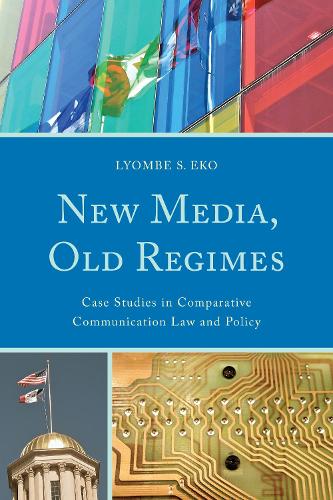
New Media, Old Regimes: Case Studies in Comparative Communication Law and Policy
(Paperback)
Publishing Details
New Media, Old Regimes: Case Studies in Comparative Communication Law and Policy
By (Author) Lyombe S. Eko
Bloomsbury Publishing PLC
Lexington Books
2nd May 2014
United States
Classifications
Professional and Scholarly
Non Fiction
Digital, IT and Communications law
Comparative law
International law
343.099
Physical Properties
Paperback
456
Width 155mm, Height 228mm, Spine 33mm
685g
Description
New Media, Old Regimes: Case Studies in Comparative Communication Law and Policy, by Lyombe S. Eko, is a collection of novel theoretical perspectives and case studies which illustrate how different communication law regimes conceptualize and apply universal ideals of human rights and freedom of expression to media controversies in real space and cyberspace. Ekos investigation includes such controversial communication policy topics as North African regimes failed use of telecommunications to suppress the social change of the Arab Spring, the Mohammad cartoon controversy in Denmark and France, French and American policy of development and diffusion of the Minitel and the Internet, American and Russian regulation of internet surveillance, the problem of managing pedopornography in cyberspace and real space, and other current communication policy cases. This study will aid readers not only to understand different national and cultural perspectives of thorny communication issues, but also show that though freedom of expression is a pluralistic concept, the actions of all political regimes at the national, transnational, and international levels must be held up to the universal standards of freedom of expression set forth in the Universal Declaration of Human Rights. New Media, Old Regimes provides essential scholarship on comparative communication law and policy in a world of new media.
Reviews
New Media, Old Regimes is one of the most interesting and innovative studies of comparative communications law available. Eko's use of a case-study approach to reveal the tensions between different political and cultural systems and their differing concepts of freedom of expression is extremely effective and enlightening. -- Eric Easton, University of Baltimore
This book offers both a contribution to the theoretical foundations of comparative communication law and policy and thought-provoking case studies that illustrate clashes between culturally specific interpretations of communication rights and obligations. -- Manuel Puppis, Univeristy of Zurich, Switzerland
This is a fine book by an able media law scholar, whose research has informed me over the years, especially when I wanted to expand my "reverse perspective" on American law on freedom of speech and the press." -- Kyu Ho Youm, Association for Education in Journalism and Mass Communication
Author Bio
Lyombe S. Eko is an associate professor of communication and co-director of the African Studies Program at the University of Iowa.
